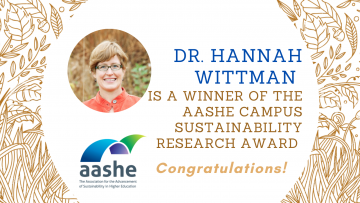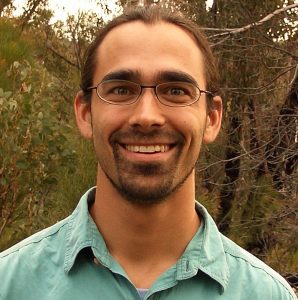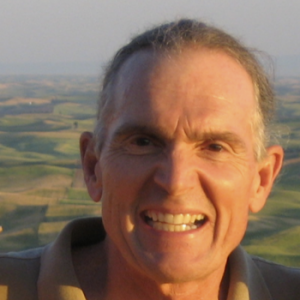
January 2022: The Association for the Advancement of Sustainability in Higher Education (AASHE) announced Dr. Hannah Wittman as a winner of the AASHE Campus Sustainability Research Award.
November 2021: AASHE announced Dr. Hannah Wittman as a finalist for a 2021 AASHE Sustainability Award in the campus sustainability research category, recognizing outstanding scholarship in higher education. Her publication, Can public universities play a role in fostering seed sovereignty? with colleagues Dr. Alexandra Lyon and Dr. Harriet Friedmann, was highlighted.
The AASHE Sustainability Awards provide global recognition to the individuals and organizations leading the higher education sustainability movement. With the help of volunteer judges, this program raises the visibility of high-impact projects, pioneering research, and student leadership that helps to disseminate innovations and inspire continued progress toward environmental, social and economic health.
The outstanding individuals and institutions recognized as finalists were selected based on overall impact, innovation, stakeholder involvement, clarity and other criteria specific to each award category. Winners will be celebrated during a virtual awards ceremony on Thursday, Dec. 9 at noon Eastern.
“The higher education sustainability community continues to show themselves as leaders in the global sustainability movement. This is never more evident than through the many entries received for the AASHE Sustainability Awards,” said Executive Director Meghan Fay Zahniser. “I am proud to recognize the innovation and leadership demonstrated by this year’s finalists.”
To learn more about AASHE’s Sustainability Awards programs, please visit http://www.aashe.org/get-involved/awards/.
IRES Seminar Series
Time: 12:30pm to 1:30pm (every Thursday)
Via Zoom only.
*********************************************************************************
Integrating agroforesters’ & ecologists’ knowledge to restore forests through agroecological production
Abstract:
Successional agroforestry offers great potential to accelerate and scale out ecosystem restoration and produce healthy food at the same time on the same land. Yet, simultaneous ecological and socioeconomic success requires detailed knowledge of management traits of diverse plants and experience with efficient allocation of labor and inputs in space and time. Traditional knowledge, contemporary practitioners and socioecological science complement one another to test and adapt know-how. Hands-on collective work sessions and interactive online database sharing help to optimize tradeoffs between cultivated biodiversity, labor-efficiency and operational viability. Spatial and temporal arrangements of polycultures seek to raise crop functional diversity sufficiently to occupy ecological niches compatible with the disturbance regime of available agricultural tools and machinery. The resulting efficient use of space, light, nutrients, water and labor reduces external inputs and facilitates permanent conservation by sustainable use of native biodiversity.
Ilyas Siddique

Associate Professor of Agroecosystems, Federal University of Santa Catarina (Brazil)
Bio:
Ilyas Siddique is an Associate Professor of Agroecosystems at the Federal University of Santa Catarina (Brazil). His research focuses on functional diversity in successional agroforestry, tropical forest restoration through sustainable use, mechanization of syntropic agriculture, ecosystem multifunctionality and food sovereignty. His outreach seeks to foster the dialog of knowledge among scientists, practitioners and traditional ecological knowledge to catalyze the adoption and diversification of agroforestry. He coordinates the Network of Agroecological Agroforestry of Southern Brazil (Rede SAFAS), which is currently elaborating a citizen science open database of crop management traits.
IRES Seminar Series
Time: 12:30pm to 1:30pm (every Thursday)
Location: AERL Theatre (room 120), 2202 Main Mall
*********************************************************************************
Addressing Agricultural Sustainability
Abstract:
Agriculture is at a critical juncture. While trying to provide calories for 7.9 billion people, agriculture is a major contributor to global greenhouse gases, biodiversity loss, nutrient pollution, land clearing, soil degradation, and public health problems. Concerns about the long-term sustainability of agriculture have promoted interest in alternative, more diversified farming systems, such as organic, agroforestry, and regenerative agriculture, compared to mainstream conventional systems. These alternative farming systems are better at contributing to multiple sustainability goals but are expanding too slowly to be transformational. Incentives for appropriate markets, reform of farm-related policies, and reorientation of publicly funded agricultural science are needed to hasten farmers adopting these more sustainable farming systems. Additionally, consumers play a vital role in the foods they choose to eat.
John Reganold

Visiting Professor, IRES
Bio:
Dr. John Reganold has shaped his career by his interest in soil science and agriculture, receiving his Ph.D. in Soil Science from the University of California at Davis. He is currently Regents Professor of Soil Science and Agroecology at Washington State University. He has spent 30-plus years bringing a blend of innovative teaching and research on soil quality and sustainable farming systems into the mainstream of higher education and food production. He has had the privilege of teaching more than 4000 students in the classroom. He has published extensively in scientific journals, magazines, and books, including ScienceNature, and Scientific American.
Dr. Reganold is an International Visiting Research Scholar supported by the Peter Wall Institute for Advanced Studies at UBC.
IRES Visiting Professor Term: August 2021 – December 2021.
IRES and Faculty of Land and Food Systems are seeking an interdisciplinary scholar who uses econometric and other quantitative techniques to investigate human dimensions of biodiversity conservation. For example, research interests may include how individual and institutional actions affect conservation outcomes, or how biodiversity conservation affects aspects of human well-being. Anticipated start July 1, 2022.


